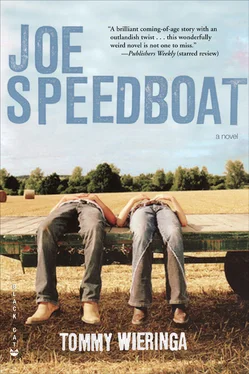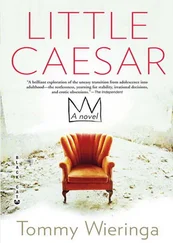Joe shakes his head. ‘She married my father as a Hindu princess and Mahfouz as Nefertiti. She’s the whole history of the world rolled into one.’
At the spot where the Demsté shipyard once stood — the firm went bankrupt in 1932, but when the water’s low you can see what’s left of the slips — Mahfouz has built a framework of planks in the form of a ship. It’s not very long, six metres or so, and it’s shaped differently from what you usually see around here. The frame is only the rough form of what the boat will be, but it looks broader than our sailboats. The front and back curve up only slightly, more like a cargo ship than a yacht. Here and there along the quay are sawhorses with planks laid across them, and weights to slowly bend the wood into shape.
Regina bikes down along the Lange Nek to bring Mahfouz tea, bread and cigarettes. She devours him with her eyes, her Nubian. The colour that our winter wiped from his face is gradually coming back. He’s building her a flagship, she lights his cigarettes and pours him tea with enough sugar in it to knock the enamel off your teeth. Reluctantly he lays aside his plane and sits down beside her. From her bag she produces sandwiches wrapped in silver foil. Ferryboat passengers stop and look at the shipyard’s small-scale resurrection. Mahfouz works amid the paintless sloops on their trailers with flat tyres and the green river buoys twice a man’s height, all waiting to be hauled away by Hermans & Sons. He works hard, he wants to launch the boat this very summer. The steam box he’s built to bend the stubborn rib beams consists of a length of pipe; he hangs the rib in the pipe, boils water on a small fire under it, and the steam disappears into the pipe and softens the wood.
‘Wow,’ Joe says as we watch him from the top of the landing, ‘he’s pretty good.’
‘He could make a living at that,’ Christof says.
Engel is thinking about it.
‘If it was me I’d paint it blue.’
In response to a mysterious kind of magnetism, Christof and I turn our heads at the same moment in the direction of Lomark and see P.J. coming along the Lange Nek. That kindles a flame in the two of us, but the company she’s in creates a cold counter-current: Joop Koeksnijder.
‘Dirty Nazi,’ Christof hisses.
That never dies out. Of course Look-at-how-cool-I-am Koeksnijder isn’t a Nazi, but his grandfather was, and that’s still the first thing that comes to mind when you see his grandson, especially when he’s with P.J. Eilander. The prick. We hate Jopie with a hatred fed by intense envy. And we hate that even more. He possesses the object of our dreams — look, she gives him a shove and he hops away, you can feel their obsession with each other all the way over here. Like disgruntled old men, we turn back to Mahfouz and his boat.
It takes forever for P.J. and Jopie to get six feet away from us, where they stop to view the activity down in the old shipyard. Koeksnijder nods to us, Engel and Joe return his greeting.
‘He’s building a boat ,’ I hear P.J. say in amazement.
Her Afrikaans has worn away to a faint accent.
‘Enough of those around, I’d say,’ Koeksnijder says.
I don’t look at P.J., because she can read my thoughts this way too.
‘Joe,’ she asks, ‘isn’t that your mother’s husband? The man from Egypt?’
Joe nods.
‘Papa Africa,’ he says, and that really makes her laugh.
Koeksnijder moves behind her and a little to one side, in the attitude of a man protecting something.
‘Papa Africa,’ P.J. repeats. ‘So what does that make me?’
‘The daughter of the man who hurt me last week. Two cavities.’
Koeksnijder lays a hand on P.J.’s lower back, the way impatient husbands do on Saturday afternoon as they propel their wives past the shop windows.
‘We’re going across the river,’ P.J. announces. ‘Bye-bye!’
Christof mumbles something dull, Engel says, ‘Good luck with your finals.’
The gates of the ferry close behind them, we watch them go.
‘She likes you,’ Engel says to Joe.
‘You’re the one who deals with the women around here,’ Joe says. ‘I’ll stick to things that run on petrol.’
Engel, accustomed by now to his own electrifying effect on girls, shakes his head in disbelief.
‘She never looked at me even once. .’
In preparation for their lives to come, Joe, Engel and Christof attend the orientation day for higher education. Joe comes home from the polytechnic looking disappointed.
‘Worthless,’ he says, ‘I could teach myself that just as easily. That place smells of nothing.’
It’s only when he goes along with Engel to the art academy, just for a lark, that he finds what he wants. The Applied Arts section has exactly what he was looking for: lathes and CO 2welders. The studio is full of mysterious constructions in various stages of development, and the walls are hung with the most minute working drawings.
‘The whole place smells like machine oil,’ he says.
Only then do I realize that his comment about the odour of nothingness at the polytechnic was meant literally. He follows his nose, and that’s new to me.
Engel signs up for a major in illustration, Joe for the applied arts. In order to be admitted, they have to present work that demonstrates both their talent and their motivation. Engel shows up with a portfolio full of work that qualifies him immediately, Engel is a natural born artist if ever there was one. I’ve never thought of Joe as an artist, though, and as far as I know he never has either. He could just as easily become an instrument maker or a technical engineer. But although he admires engineers for giving the world its motor skills, when he thinks about it he finds himself better suited to a freer curriculum.
On the day of the entrance exam he unbolts the wings of his plane and lashes the whole thing onto a trailer. Dirty Rinus drives him to the academy; when they go in the porter says, ‘You’re not allowed to smoke in here, sir,’ effectively banishing the little farmer out of doors for the rest of the morning. Joe rolls the fuselage into the building and installs it in the room where the evaluation will be taking place. Once the wings are back on it, all the space is taken up. And does it really work? a professor asks. Joe climbs in and starts the engine. A tornado tears through the classroom. He’s accepted.
*
But let’s go, time is running short, next Monday will see the start of the big test to show who’s ready for the world and who isn’t.
There’s cruelty in the fact that the exams take place on the loveliest day of the year. The fields are groaning with vigour, trees unfurl their leaves with the pleasure of a person stretching his limbs. Above it all shines a tingling spring sun that urges everything on to more, while we sit row by row in the assembly hall and have no part in it. We shuffle our feet restlessly, cough faintly and chew on government-issue biros. Cursed be the first to finish and turn in his exam with serene superiority. Cursed too the man on rubber soles who sneaks along the aisles. And completely cursed be P.J., with whom I share the same electives, leaving my mind eclipsed sevenfold by things other than anaerobic dissimilation and the pseudopodia of amoebae. Shame on her for the lustiness of such a body. It emits signals of nothing but plenty. I ogle the white flesh of her rounded upper arms like a starving cannibal, and feel little and evil at the deregulating message of her hips as she leaves the room while most of us are still hard at work. A few weeks later I will look first under the letter E on the list of candidates and see that she has passed with a 9 for biology, and nothing lower than an 8 for the other subjects. I myself prove to be a solid 7.8 man, but let me blame that on her presence.
Читать дальше












